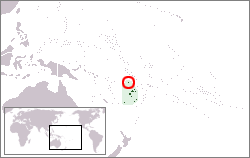
The ITU Telecommunication Standardization Sector (ITU-T) is one of the three sectors of the International Telecommunication Union (ITU); it coordinates standards for telecommunications.

The International Telecommunication Union, originally the International Telegraph Union, is a specialized agency of the United Nations (UN) that is responsible for issues that concern information and communication technologies. It is the oldest among all the 15 specialised agencies of UN.

The rock ptarmigan is a medium-sized gamebird in the grouse family. It is known simply as the ptarmigan in the UK and in Canada, where it is the official bird for the territory of Nunavut, Canada, and the official game bird for the province of Newfoundland and Labrador, Canada. In Japan, it is known as the raichō (雷鳥), which means "thunder bird". It is the official bird of Gifu, Nagano, and Toyama Prefectures and is a protected species nationwide.
Fijians are a nation and ethnic group native to Fiji, who speak Fijian and share a common history and culture.

Fiji is divided administratively into four divisions, which are further subdivided into fourteen provinces; the self-governing island of Rotuma and its dependencies lie outside any of the four divisions. Each division is headed by a Commissioner, appointed by the Fijian government. The divisions are basically agglomerations of provinces and have few administrative functions of their own, but serve to foster cooperation among the member provinces for providing services. Each province has a provincial council which may make bylaws and impose rates, subject to the approval of the Fijian Affairs Board, a government department. The board must also approve the appointment of the Roko Tui, or executive head of the provincial council, who is usually a high chief, although in recent years, commoners have sometimes been chosen.
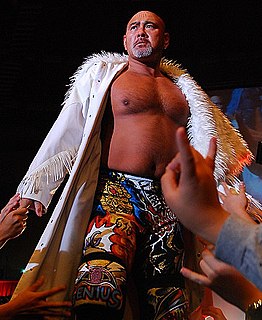
Keiji Mutoh is a Japanese professional wrestler who first gained international fame in the National Wrestling Alliance (NWA). He is mostly known for his work as The Great Muta in New Japan Pro Wrestling (NJPW) during the 1990s, but he has also worked in the United States, Puerto Rico, Mexico, and Taiwan. He is a former president of All Japan Pro Wrestling (AJPW), as well as being a full-time wrestler for the promotion from 2002 to 2013.
The Council of Rotuma is a municipal body on the island of Rotuma, a Fijian dependency. Owing to the unique character of Rotuma, the powers of this council are greater than those of other municipal bodies in Fiji and in some ways it approximates a legislative body, though it is in every way subordinate to the Parliament of Fiji.
The Rotuma Group is a group of volcanic islands with Rotuma Island being the main island, located at 12°35′S177°10′E, approximately 465 km north of Fiji.
The ITU-T Recommendation E.212 defines mobile country codes (MCC) as well as mobile network codes (MNC).
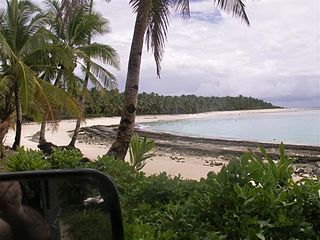
Motusa is a group of close villages in the district of Itu'tiu, on the island of Rotuma, one of the islands of Fiji. Rotuma is made up of two volcanic landmasses connected by a sandy isthmus, on which Motusa is located.
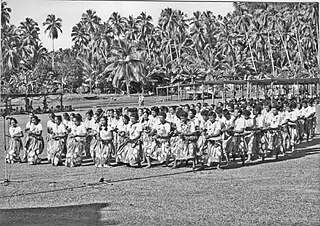
Dance in Rotuma refers to the traditional and modern dance styles performed by the people of the island of Rotuma, which became a dependency of Fiji in 1881. Despite Rotuma's political and historical links with Fiji, the island's culture shows strong Polynesian influences, particularly from Samoa and Tonga, which, along with Fiji, feature strongly in the history and traditions of the Rotuman people.
Gagaja[ŋaŋatʃa] is a Rotuman word denoting the position of "Chief" or "Lord". This could be a formal chiefly position in one of the seven districts or a village chief as well as to anyone else, such as the Chairman of the Rotuma Island Council to whom respect and deference is owed based on their own skills and attributes. Unlike in many other Pacific cultures, the official chiefly positions are not allocated according to any strict primogeniture, but rather are elected from all eligible males within certain kạinaga to whom the chiefly title belongs.
The Fakpure was the secular ruler of Rotuma in the pre-European contact times. It was one of three chiefly roles with direct influence across the island of Rotuma, the other two being the Mua and the Sau. Traditionally the most senior political authority on the island, the Fakpure was one of the gagaj ‘es itu’u of the districts of Rotuma, and the convener of the island’s Council of Chiefs. After being elected as the district chief through the traditional processes, the position of fakpure was bestowed on the most senior of these district chiefs, usually the chief whose district had won the most recent war, who also received the privilege of being the first served in the politically charged kava ceremony.

Itu'ti'u is one of the seven districts on the island of Rotuma, a dependency of Fiji. Rotuma's capital, the village of Ahau, is located in this district. It also includes the villages of Savlei, Lau, Feavai, Tuakoi, Motusa, Ropure, Melsa'a, and Losa.
The Rotumans are the indigenous inhabitants of Rotuma, a small island group forming part of the Republic of Fiji. The island itself is a cultural melting pot at the crossroads of the Micronesian, Melanesian and Polynesian divisions of the Pacific Ocean, and due to the seafaring nature of traditional Pacific cultures, the indigenous Rotuman have adopted or share many aspects of its multifaceted culture with its Melanesian, Micronesian and Polynesian neighbours.
Vilsoni Hereniko is a Fiji Islander playwright, film director and academic. He was the writer and director of Fiji's first ever feature film, The Land Has Eyes.

The ITU World Triathlon Series is the International Triathlon Union's annual series of triathlon events used to crown an annual world champion. There are multiple rounds of competitions culminating in a Grand Final race. Athletes compete head-to-head for points in these races that will determine the overall ITU world champion. The elite championship races are held over two distances the standard and the sprint distance.

Malhaha is one of the seven districts on the island of Rotuma, a dependency of Fiji. It includes the villages of Pepheua, Else'e, and Elsio. It is here that Raho, the founder of Rotuma, established his residence.
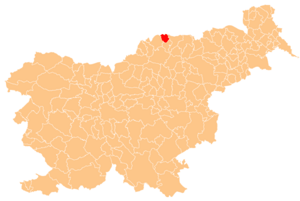
The Municipality of Muta is a municipality in northern Slovenia. The seat of the municipality is the town of Muta.

